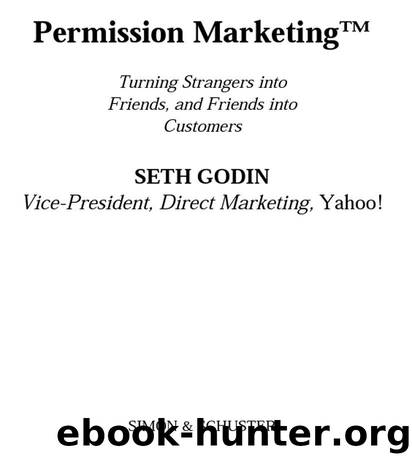Permission Marketing by Godin Seth

Author:Godin, Seth [Godin, Seth]
Language: eng
Format: mobi, epub
Publisher: Simon & Schuster
Published: 1999-07-13T16:00:00+00:00
SEVEN
Working with Permission as a Commodity
You’re not allowed to date your best
friend’s girlfriend.
ONCE YOU HAVE EARNED PERMISSION, you must keep it and attempt to expand it. These four rules go a long way to help marketers understand permission:
Permission is nontransferable.
Permission is selfish.
Permission is a process, not a moment.
Permission can be canceled at any time.
PERMISSION IS NONTRANSFERABLE
It doesn’t matter how long you’ve been dating—you’re not allowed to send a stand-in on a date. You’re not allowed to date your best friend’s girlfriend or boyfriend.
This rule causes direct marketers the biggest fits. Why? Because in traditional marketing it is totally okay to rent or sell or transfer data. It gets done, secretly, every single day. In fact, it’s a multibillion-dollar industry.
It’s scary, but it’s true: You can rent the name and address of every woman in New York City who has a permit to carry a gun. Then you can filter this data further to produce a list of those women who have a child in private school. Or who live in a building with a high likelihood of tenants who stay in first-class hotels when they travel. Want a list of dental floss users? Not a problem. You can even buy them by brand!
Perhaps the most amazing personal data available comes from the supermarket. If you carry a savings or bonus card, a computer somewhere knows exactly which groceries you buy.
Last year more than $1.2 trillion worth of goods and services were sold by direct mail. More than half of that was sold directly to consumers. So the information stakes are high.
Direct mail marketers have discovered that the way to combat their arch enemy—the cost of stamps and printing—is to buy the very best mailing lists they can find. They test and refine and research and cross-reference, all in search of increasing the response rates to their mailings by a tenth of a point.
Permission Marketing is at odds with the secret sorting and evaluation of data. Why? Because it takes consumers by surprise. And when you surprise a consumer, not only do you void permission, you increase fear. More than 80 percent of all consumers polled indicated that they’re afraid of the data being collected about them. Far worse (from a marketer’s point of view) is that this same fear is the single greatest impediment to consumers shopping online.
The transferability of permission seems harmless until you realize that once transferred, it ceases to be permission. If a company sends me a mailing that I didn’t explicitly ask for, I am going to ignore it. We’re back to spam again.
The morality of gathering information isn’t as important for this discussion as the effectiveness of it. And even relevant advertising when directed to recipients without their permission cannot be as effective as that same advertising with permission attached.
On the Net, a company called Imgis is about to completely eliminate banner advertising as Web surfers have come to know it. Today, when you visit a Web site, you see a small rectangular ad on the bottom of the screen.
Download
This site does not store any files on its server. We only index and link to content provided by other sites. Please contact the content providers to delete copyright contents if any and email us, we'll remove relevant links or contents immediately.
Influence: The Psychology of Persuasion by Robert B. Cialdini(4796)
The Miracle Morning by Hal Elrod(4728)
The Hacking of the American Mind by Robert H. Lustig(4383)
Pre-Suasion: A Revolutionary Way to Influence and Persuade by Robert Cialdini(4232)
Unlabel: Selling You Without Selling Out by Marc Ecko(3663)
Ogilvy on Advertising by David Ogilvy(3622)
Hidden Persuasion: 33 psychological influence techniques in advertising by Marc Andrews & Matthijs van Leeuwen & Rick van Baaren(3566)
Purple Cow by Seth Godin(3205)
Who Can You Trust? by Rachel Botsman(3133)
Kick Ass in College: Highest Rated "How to Study in College" Book | 77 Ninja Study Skills Tips and Career Strategies | Motivational for College Students: A Guerrilla Guide to College Success by Fox Gunnar(3131)
The Marketing Plan Handbook: Develop Big-Picture Marketing Plans for Pennies on the Dollar by Robert W. Bly(3063)
This Is Marketing by Seth Godin(3038)
I Live in the Future & Here's How It Works by Nick Bilton(2997)
The Power of Broke by Daymond John(2988)
The Tipping Point by Malcolm Gladwell(2925)
Building a StoryBrand by Donald Miller(2916)
The 46 Rules of Genius: An Innovator's Guide to Creativity (Voices That Matter) by Marty Neumeier(2856)
Draw to Win: A Crash Course on How to Lead, Sell, and Innovate With Your Visual Mind by Dan Roam(2785)
Market Wizards by Jack D. Schwager(2701)
